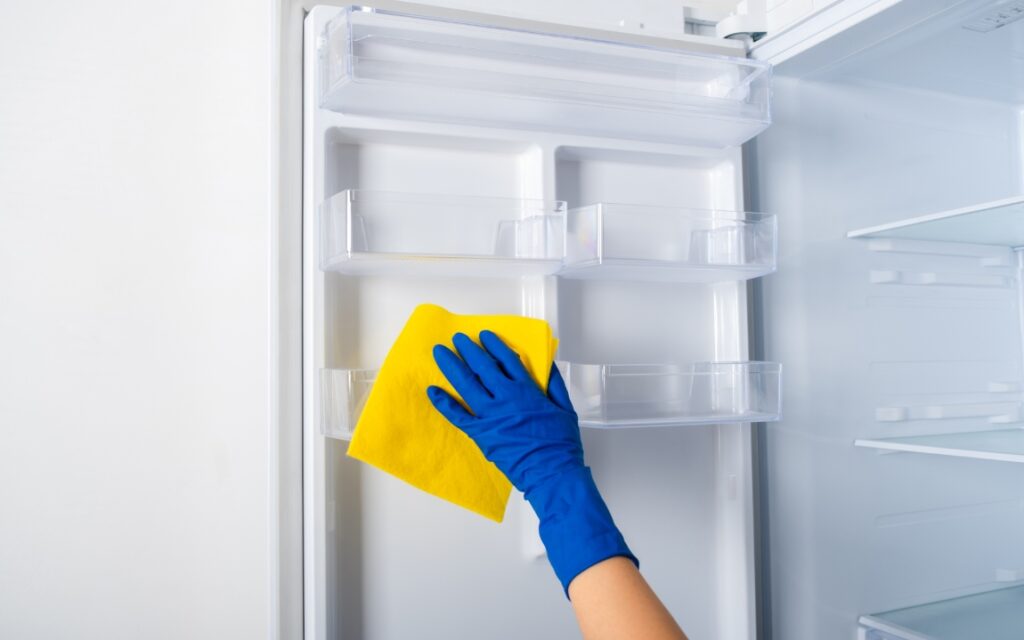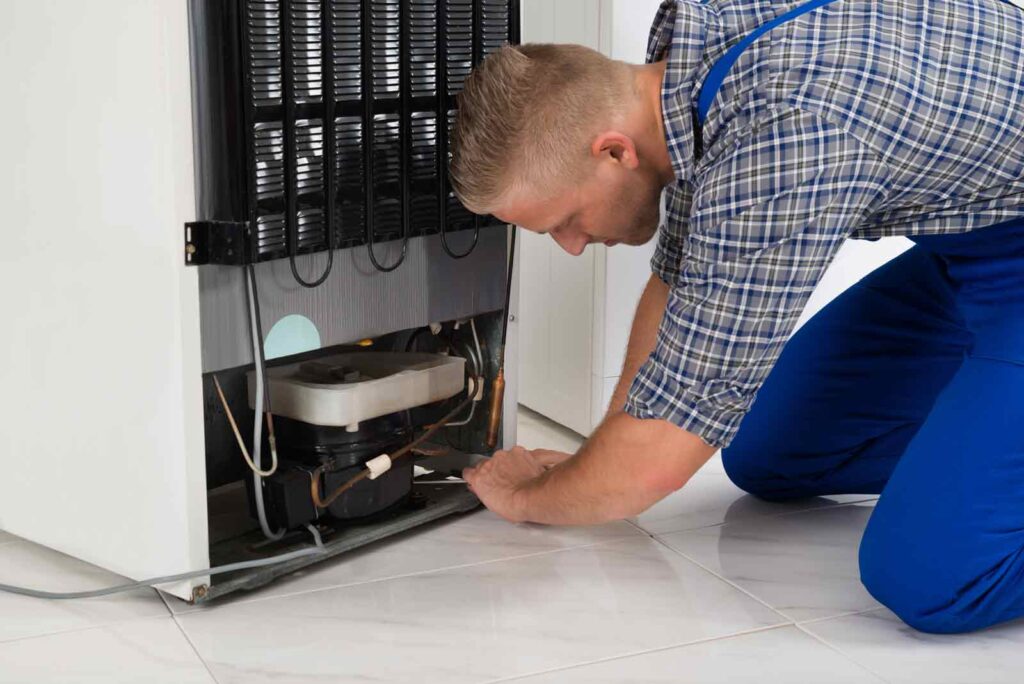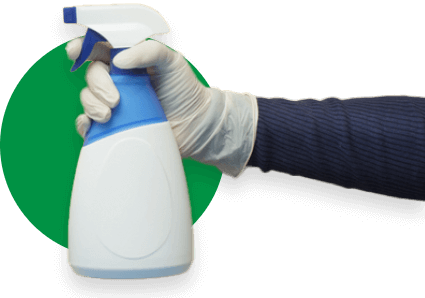In the fast-paced world of commercial kitchens, refrigerators serve as unsung food preservation and safety heroes. These vital appliances work tirelessly to keep ingredients fresh and meals safe for consumption. However, the demanding nature of food service operations often leads to neglect of these essential units. This comprehensive guide will explore the critical importance of maintaining clean commercial refrigerators, provide a detailed timeline for upkeep, and offer best practices to ensure your fridge operates at peak efficiency.
Why Cleaning a Commercial Refrigerator is Important
Commercial refrigerators face a barrage of challenges in bustling kitchen environments. The constant flow of staff, frequent door openings, and regular restocking create ample opportunities for spills, stains, and the accumulation of food debris. While it’s easy to overlook these issues amid the chaos of daily operations, neglecting regular cleaning can have serious consequences:
- Cross-contamination Risks: Uncleaned surfaces can harbor harmful bacteria, potentially spreading from one food item to another.
- Compromised Food Quality: Lingering odors and residues can affect the taste and freshness of stored ingredients.
- Customer Dissatisfaction: Poor food quality from improper storage conditions can lead to negative dining experiences.
- Health Code Violations: Dirty refrigerators are a red flag for health inspectors and can result in citations or even temporary closure.
- Equipment Inefficiency: Buildup on critical components like condenser coils can force the unit to work harder, increasing energy consumption and wear.
Beyond these operational concerns, maintaining cleanliness is a matter of legal compliance. Health regulations set forth by local health departments and federal bodies, such as the FDA, mandate the regular cleaning of commercial refrigeration units. These guidelines aren’t merely suggestions; they’re enforceable rules designed to protect public health and meet food safety standards across the industry.

Advantages of Keeping Commercial Refrigerators Clean
Implementing a rigorous cleaning regimen for your commercial refrigerator yields numerous benefits that extend far beyond mere aesthetics:
- Enhanced Food Safety: Regular cleaning eliminates potential breeding grounds for harmful microorganisms. By maintaining a sanitary environment, you dramatically reduce the risk of foodborne illnesses originating from your kitchen. This proactive approach to food safety protects your customers and your business’s reputation.
- Improved Equipment Durability: Dust, grime, and food particles can accumulate on vital components like compressors, fans, and coils. This buildup forces the refrigerator to work harder, leading to increased wear and tear. By keeping these parts clean, you extend the lifespan of your equipment, potentially saving thousands in premature replacement costs.
- Energy Efficiency: A clean refrigerator operates more efficiently. When condenser coils are free from dust and debris, they can effectively release heat, allowing the compressor to run less frequently. This efficiency translates directly into lower energy consumption and reduced utility bills—a significant consideration given the constant operation of commercial refrigerators.
- Odor Control: Food spills and expired products can create unpleasant odors permeating the refrigerator. These odors can transfer to other stored items, affecting their taste and quality. Regular cleaning prevents the development and spread of these odors, ensuring that your ingredients remain fresh and appetizing.
- Regulatory Compliance: Health inspectors pay close attention to the cleanliness of refrigeration units during their visits. A well-maintained fridge demonstrates your commitment to food safety and hygiene standards. This compliance helps you avoid penalties and builds trust with regulators, potentially leading to less frequent inspections and a positive reputation in the industry.
- Improved Organization: Clean refrigerators promote better organization of stored items. When shelves and drawers are regularly cleared and cleaned, it’s easier to implement and maintain an organized storage system. This organization can lead to less food waste, as items are less likely to be forgotten or lost in the back of a cluttered fridge.
- Enhanced Workplace Morale: A clean kitchen, including well-maintained refrigerators, creates a more pleasant work environment. Staff members are likely to take more pride in their workspace. They may be more motivated to maintain cleanliness standards throughout their shifts.
Recommended Cleaning Frequency for Commercial Fridges
To reap the full benefits of a clean commercial refrigerator, it’s essential to implement a comprehensive cleaning schedule. This timeline breaks down tasks into daily, weekly, monthly, and semi-annual frequencies, ensuring that every aspect of your fridge receives appropriate attention:
Daily Cleaning Chores
Daily maintenance forms the foundation of your cleaning regimen. These quick but crucial tasks help prevent the buildup of grime and reduce the workload of deeper cleaning sessions:
- Surface Wipe-down: At the end of each day, thoroughly wipe all interior surfaces with a solution of warm water and mild detergent. Pay special attention to areas prone to spills, such as shelf edges and door bins.
- Door Handle Disinfection: Sanitize door handles using a food-safe disinfectant. These high-touch areas can be hotspots for bacterial transfer between staff members.
- Spill Check and Cleanup: Inspect the entire interior for any spills or leaks. Clean these immediately to prevent staining and odor development.
- Temperature Check: Verify that the refrigerator is maintaining the correct temperature (typically between 33°F and 40°F or 0.5°C to 4°C).
- Stock Rotation: While not strictly a cleaning task, use this daily check to rotate stock, moving older items to the front to ensure they’re used first.

Weekly Cleaning Plan
Weekly tasks involve a more thorough cleaning and inspection of your commercial refrigerator:
- Deep Clean of Shelves and Drawers: Remove all items from the fridge. Removable shelves and drawers are removed and washed thoroughly with hot, soapy water. Use a food-safe cleaning solution for fixed components and scrub all surfaces, including corners and crevices.
- Gasket Inspection and Cleaning: Door gaskets (seals) are crucial for maintaining temperature and energy efficiency. Clean these with a soft brush and mild detergent, checking for any signs of wear or damage.
- Condenser Coil Vacuuming: Use a vacuum with a brush attachment to remove dust and debris from the condenser coils. This task is critical for maintaining the unit’s efficiency and preventing overheating.
- Drain Pan Cleaning: If your unit has an accessible drain pan, empty and clean it to prevent mold growth and unpleasant odors.
- Exterior Cleaning: Wipe down the exterior of the fridge, including the top, sides, and any accessible areas behind or underneath the unit.
Monthly Cleaning and Maintenance
Monthly tasks address areas that don’t require weekly attention but are still crucial for long-term performance:
- Drain Line Cleaning: Clear the drain line using a pipe cleaner or a solution of warm water and baking soda to prevent clogs and potential water damage.
- Thorough Mold Inspection: Conduct a detailed check for any signs of mold growth, particularly in humid areas or around door seals. Clean affected areas with a water and white vinegar solution or a commercial mold remover approved for food-contact surfaces.
- Ice Maker Maintenance: If your unit includes an ice maker, disassemble and clean all components according to the manufacturer’s instructions. This typically involves sanitizing the ice bin, water lines, and the ice-making mechanism.
- Fan Inspection and Cleaning: Check and clean the evaporator and condenser fans to ensure proper air circulation within the unit.
- Temperature Calibration Check: Verify the accuracy of the unit’s thermometer and recalibrate if necessary.
Semi-Annual Cleaning and Inspection
These comprehensive tasks, performed every six months, help ensure the long-term reliability and efficiency of your commercial refrigerator:
- Professional Coil Cleaning: While weekly vacuuming helps, an experienced technician can significantly improve efficiency by a semi-annual deep clean of the condenser and evaporator coils.
- Refrigerant Line Inspection: Have a qualified technician check refrigerant lines for any signs of wear, leaks, or damage.
- Comprehensive Performance Audit: Conduct a thorough inspection of all components, including compressors, fans, thermostats, and electrical connections. Address any issues promptly to prevent major breakdowns.
- Door Alignment Check: Ensure doors are properly aligned and sealed correctly. Misaligned doors can lead to energy waste and temperature fluctuations.
- Lubrication of Moving Parts: Apply food-grade lubricant to hinges, slides, and other moving parts to prevent wear and ensure smooth operation.

Best Practices for a Clean Commercial Fridge
Implementing these best practices will help maintain cleanliness and efficiency between scheduled cleaning sessions.
- Immediate Spill Response: Train staff to clean spills immediately, regardless of how minor they may seem.
- Regular Stock Audits: Conduct weekly checks to remove expired or spoiled items promptly.
- Proper Food Storage: Use airtight containers and follow proper food storage guidelines to prevent cross-contamination and odor transfer.
- Temperature Monitoring: Install a reliable thermometer and check it daily to ensure consistent cooling.
- Staff Training: Educate all kitchen staff on proper cleaning procedures and maintaining a clean refrigerator.
- Scheduled Defrosting: For units that aren’t self-defrosting, schedule regular defrosting sessions to prevent ice buildup.
- Ventilation Maintenance: Keep the area around the refrigerator clear to allow proper airflow and prevent overheating.
Maintain Your Commercial Fridge with Expert Cleaning Services
While daily and weekly cleaning tasks can often be managed in-house, partnering with professional cleaning services for more intensive maintenance can be a wise investment. Expert technicians bring specialized knowledge and equipment to the table, ensuring that every aspect of your commercial refrigerator receives proper care.
Professional services can offer:
- Deep cleaning of hard-to-reach components
- Expert diagnostics to catch potential issues early
- Proper handling of chemical cleaners and sanitizers
- Time-saving efficiency, allowing your staff to focus on food preparation
- Documentation of cleaning and maintenance for regulatory compliance
By combining diligent in-house cleaning with periodic professional servicing, you can maximize the lifespan and efficiency of your commercial refrigerator while ensuring the highest standards of food safety and quality.

FAQs About How Often Commercial Fridges Should Be Cleaned
How often should you service a commercial refrigerator?
While daily and weekly cleaning can be managed in-house, having a professional service your commercial refrigerator every three to six months is recommended. This frequency allows for thorough inspections and maintenance of complex components, helping to prevent unexpected breakdowns and extend the appliance’s lifespan.
What are the guidelines for cleaning fridges?
Follow these general guidelines for effective fridge cleaning:
- Always start by emptying the fridge completely.
- Use warm, soapy water for general cleaning, avoiding harsh chemicals that might contaminate food.
- Pay special attention to corners, gaskets, and other areas where debris can accumulate.
- Rinse surfaces thoroughly with clean water to remove any soap residue.
- Dry all surfaces completely to prevent mold growth.
- For sanitizing, use a solution of 1 tablespoon of unscented, liquid chlorine bleach per gallon of water.
- Allow the unit to return to the proper temperature before restocking.
How often should you clean a commercial freezer?
Commercial freezers generally require less frequent cleaning than refrigerators due to the lower risk of spills and contamination. However, a thorough cleaning every three to four months is recommended. This should include defrosting (if not self-defrosting), sanitizing all surfaces, and checking seals and gaskets for proper function.
What is the life expectancy of a commercial refrigerator?
With proper maintenance, a commercial refrigerator can last 10–15 years. However, this lifespan can vary based on usage patterns, environmental factors, and the quality of ongoing maintenance. Signs that it might be time for replacement include frequent repairs, the inability to maintain consistent temperatures, and significantly increased energy consumption.
What happens if you don’t clean your fridge?
Neglecting to clean your commercial refrigerator can lead to a cascade of problems:
- Reduced energy efficiency, resulting in higher electricity bills
- Increased risk of food contamination and spoilage
- Development of unpleasant odors that can affect food quality
- Potential health code violations and associated penalties
- The shortened lifespan of the appliance due to strain on components
- Decreased cooling capacity, potentially compromising food safety
Regular cleaning, especially of critical components like condenser coils, is essential for maintaining the performance and longevity of your commercial refrigerator.






